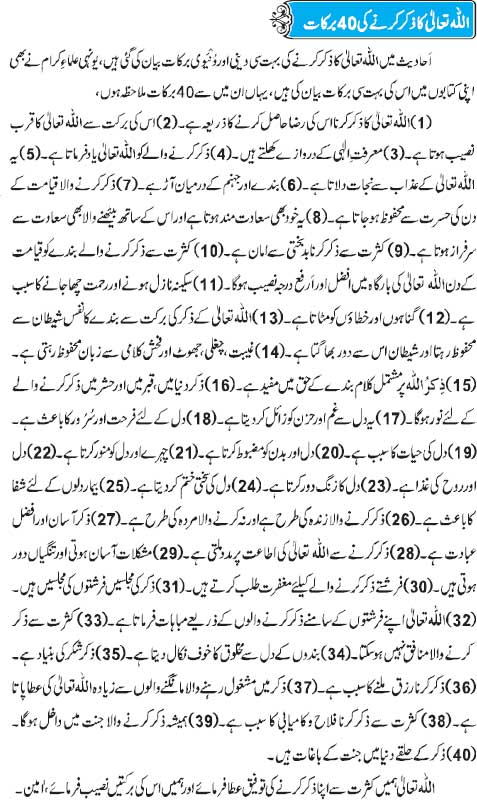
Eating Habits And Diet Of The Prophet
The Prophet’s guidance with regard to food is perfect guidance. It was described by Ibn al-Qayyim as follows: When he put his hand in the food, he would say, “Bismillaah (in the Name of Allah), and he told people to say this when eating.
He said, “When any one of you eats, let him mention the name of Allah. If he forgets to mention the name of Allah at the beginning, let him say Bismillaahi fi awwalihi wa aakhirihi (in the name of Allah at its beginning and at its end).”
Saheeh hadeeth, narrated by al-Tirmidhi (1859) and Abu Dawood (3767).
When he raised the food to his mouth, he would say,
“Al-hamdu Lillaahi hamdan katheeran tayyiban mubaarakan fihi ghayri makfiyyin wa laa muwadda wa laa mustaghni ‘anhu Rabbanaa azza wa jall (Allah be praised with an abundant, beautiful, blessed praise. He is the One Who is Sufficient, Who feeds and is never fed, The One Who is longed for, along with that which is with Him, and the One Who is needed. He is Our Lord, may He be glorified).
Narrated by al-Bukhaari (5142).
He never criticized food at all. If he liked it, he would eat it, and if he did not like it, he would leave it and not say anything.
Narrated by al-Bukhaari (3370) and Muslim (2064).
Or he would say, “I do not feel like eating this.” Narrated by al-Bukhaari (5076) and Muslim (1946).
Sometimes he would praise the food, as when he asked his family for food, and they said, “We have nothing but vinegar.” He asked for it and started to eat it, saying, “What a good food is vinegar.”
Narrated by Muslim (2052)
He used to talk whilst he was eating, as is seen from the report quoted above about vinegar.
And he said to his step-son Umar ibn Abi Salamah when he was eating with him: “Say Bismillaah and eat from that which is in front of you in the dish*.” Narrated by al-Bukhaari (5061) and Muslim (2022).
[* At the time of the Prophet (peace and blessings of Allah be upon him), people used to eat together from one dish, and children would sometimes forget the correct etiquette. – Translator]
He would repeatedly urge his guests to eat, as generous hosts do, and as is seen in the hadeeth of Abu Hurayrah, narrated by al-Bukhaari, about the story of drinking milk, where he repeatedly said to him, “Drink!” and he kept telling him to drink until he (the guest) said, “By the One Who sent you with the truth, I have no more room for it!”
Narrated by al-Bukhaari (6087).
When he ate with others, he would not leave until he had made dua for them.
He made dua in the house of Abd-Allah ibn Bisr, and said: “O Allah, bless for them that which You have provided for them, forgive them and have mercy on them.”
Narrated by Muslim (2042).
He commanded people to eat with their right hands and forbade them to eat with their left hands. He said, “The Shaytaan eats with his left hand and drinks with his left hand.”
Narrated by Muslim (2020).
This implies that eating with the left hand is haraam, and this is the correct view, because the one who eats with his left hand is either a Shaytaan (a devil), or he is imitating the Shaytaan.
It was also reported in a Saheeh hadeeth that he told a man who was eating with his left hand in his presence, “Eat with your right hand!”
The man said, “I cannot.”
He said, “May you never be able to!” – and the man never lifted his right hand to his mouth after that. Narrated by Muslim (2021).
If it was permissible (to eat with the left hand), he would not have prayed against him for doing so. It was the man’s stubborn arrogance that made him refuse to obey the command, and this is the utmost disobedience that deserved this prayer against him.
He commanded those who complained that they never felt full to eat together and not separately, and to mention the name of Allah (say Bismillaah) over the food so that He might bless it for them.”
Narrated by Abu Dawood (3764) and Ibn Maajah (3286). (See Zaad al-Maaad, 2/397-406)
It was also reported that he said, “I do not eat reclining.”
Narrated by al-Bukhaari, 5083.
He used to eat using the first three fingers (of his right hand), which is the best way of eating.
See Zaad al-Maaad, 220-222.
The Prophets guidance regarding diet:
The Prophet (peace and blessings of Allah be upon him) used to know what he was eating. He used to eat what was good for him. He used to eat enough to keep him going, but no so much as to make him fat.
Ibn Umar narrated that the Prophet (peace and blessings of Allah be upon him) said: “The believer eats in one stomach whilst the kaafir eats in seven.” Narrated by al-Bukhaari (5081) and Muslim (2060).
He taught his ummah something to protect them from diseases caused by eating and drinking.
He said: “The son of Adam does not fill any vessel worse than his stomach. It is sufficient for the son of Adam to eat a few mouthfuls, to keep him going. If he must do that (fill his stomach), then let him fill one third with food, one third with drink, and one third with air.”
Narrated by al-Tirmidhi (1381), Ibn Maajah (3349); classed as Saheeh by al-Albaani in al-Silsilah al-Saheehah (2265).
And Allah knows best.
Kasrat e Azwaaj Ka Aik Ahem Maqsad
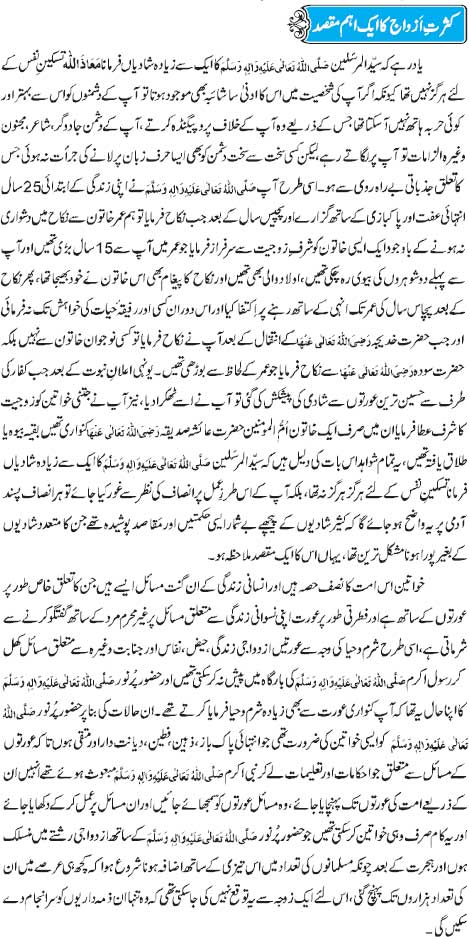
The Effects Of Sins
ONE: The prevention of knowledge: Knowledge is a light that Allah throws into the heart and disobedience extinguishes this light.
Imaam Shaafi’ee (rahimahullah) said: “I complained to Wakee’ about the weakness of my memory, so he ordered me to abandon disobedience. And informed me that the knowledge is light. And that the light of Allah is not given to the disobedient. ”
TWO: The prevention of sustenance: Just as Taqwaa brings about sustenance, the abandonment of Taqwaa causes poverty. There is nothing that can bring about sustenance like the abandonment of disobedience.
THREE: The prevention of obedience (to Allah): If there was no other punishment for sin other than that it prevents one from obedience to Allah then this would be sufficient.
FOUR: Disobedience weakens the heart and the body: It’s weakening the heart is something that is clear. Disobedience does not stop weakening it until the life of the heart ceases completely.
FIVE: Disobedience reduces the lifespan and destroys any blessings: Just as righteousness increases the lifespan, sinning reduces it.
SIX: Disobedience ows its own seeds and gives birth to itself until separating from it and coming out of it becomes difficult for the servant.
SEVEN: Sins weaken the hearts will and resolve so that the desire for disobedience becomes strong and the desire to repent becomes weak bit by bit until the desire to repent is removed from the heart completely.
EIGHT: Every type of disobedience is a legacy of a nation from among the nations which Allah Azzawajall destroyed. Sodomy is a legacy of the People of Lot, taking more than one’s due right and giving what is less is a legacy of the People of Shu’ayb, seeking greatness in the land and causing corruption is a legacy of the People of Pharoah and pride/arrogance and tyranny is a legacy of the People of Hud. So the disobedient one is wearing the gown of some of these nations who were the enemies of Allah.
NINE: Disobedience is a cause of the servant being held in contempt by his Lord. Al-Hasan al-Basree (rahimahullah) said: They became contemptible in (His sight) so they disobeyed Him. If they were honorable (in His sight) He would have protected them. Allah the Exalted said:
“And whomsoever Allah lowers (humiliates) there is none to give honor.” [Hajj 22:18]
TEN: The ill-effects of the sinner fall upon those besides him and also the animals as a result of which they are touched by harm.
ELEVEN: The servant continues to commit sins until they become very easy for him and seem insignificant in his heart and this is a sign of destruction. Every time a sin becomes insignificant in the sight of the servant it becomes great in the sight of Allah.
Ibn Mas’ood (radiy Allahu anhu) said: Indeed, the believer sees his sins as if he was standing at the foot of a mountain fearing that it will fall upon him and the sinner sees his sins like a fly which passes by his nose so he tries to remove it by waving his hand around. [Bukhaaree]
TWELVE: Disobedience inherits humiliation and lowliness. Honor, all of it, lies in the obedience of Allah. Abdullaah ibn al-Mubaarak said:
“I have seen sins kill the hearts. And humiliation is inherited by their continuity The abandonment of sins gives life to the hearts. And the prevention of your soul is better for it.”
THIRTEEN: Disobedience corrupts the intellect. The intellect has light and disobedience extinguishes this light. When the light of the intellect is extinguished it becomes weak and deficient.
FOURTEEN: When disobedience increases, the servant’s heart becomes sealed so that he becomes of those who are heedless. The Exalted said:
“But no! A stain has been left on their hearts on account of what they used to earn (i.e. their actions).” [Mutaffifeen 83:14]
FIFTEEN: Sins cause various types of corruption to occur in the land. Corruption of the waters, the air, the plants, the fruits and the dwelling places. The Exalted said:
“Mischief has appeared on the land and the sea on account of what the hands of men have earned; that He may give them a taste of some of (the actions) they have done, in order that they may return.” [Rum 30:41]
SIXTEEN: The disappearance of modesty which is the essence of the life of the heart and is the basis of every good. Its disappearance is the disappearance of all that is good. It is authentic from the Messenger (sallallahu ‘alayhi wa sallam) that he said: Modesty is goodness, all of it [Bukhaaree and Muslim] A Poet said:
“And by Allah, there is no good in life or in the world when modesty goes.”
SEVENTEEN: Sins weaken and reduce the magnification of Allah, the Mighty in the heart of the servant
EIGHTEEN: Sins are the cause of Allah forgetting His servant, abandoning him, and leaving him to fend for himself with his soul and his Shaytaan, and in this is the destruction from which no deliverance can be hoped for.
NINETEEN: Sins remove the servant from the realm of Ihsaan (doing good) and he is prevented from (obtaining) the reward of those who do good. When Ihsaan fills the heart it prevents it from disobedience.
TWENTY: Disobedience causes the favors (of Allah) to cease and make His revenge lawful. No blessing ceases to reach a servant except due to a sin and no retribution is made lawful upon him except due to a sin. Alee (radiy Allahu ‘anhu) said: No trial has descended except due to a sin and it (the trial) is not repelled except by repentance. Allah the Exalted said:
“Whatever misfortune afflicts you then it is due to what your hands have earned and (yet) He pardons many.” [Shura 42:30]
And the Exalted also said: “That is because never will Allah change the favor He has bestowed on a people until they change what is with themselves..” [Anfaal 8:53]
Imaam Ibn Qayyim Al-Jawziyyah
Source: From his Book Al-Jawaab al-Kaafee
Dekhna Jaiz Nahi
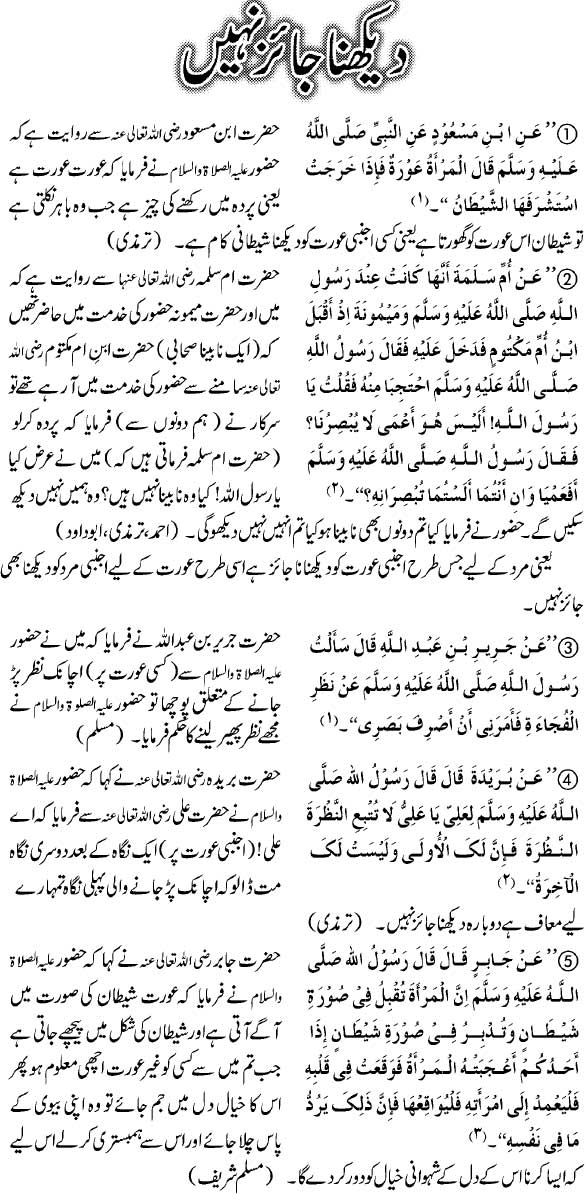
Don’t Do’s For Eid
- Men “beautifying” themselves by shaving the beard. This is a thing that most Muslims do, even though shaving the beard is Haraam in the Religion of Allah, the Perfect and Free from all imperfections. This (ruling) is shown in authentic narrations that contain a command to leave the beard. The beard is also from the Fitra, and it is not permissible to change the Fitra. Textual proof regarding the forbiddance of shaving the beard is found in the books of the four schools of thought.
- Shaking hands of strange women – those that are not Mahram for a man. This is one of the widespread problems that we suffer from and none is saved from it except he whom Allah has favored. This act is prohibited (Haraam) because the Prophet (peace be upon him) said: “To pierce a metal comb into a man’s head is better for him than for him to touch a woman, for whom he is not a Mahram. ” (Silsilatul Ahadeeth As-Saheehah, no. 227) This ruling is also found in the books of the four schools of thoughts.
- Imitating the non-believers and Westerners in their clothing, in listening to music and other reprehensible acts. Indeed the Prophet (peace be upon him) said: “Whosoever imitates a people then he is from them. ” (Ahmad) Also, because of the saying of the Prophet (peace be upon him): “There will be a group of people from my Ummah who will seek to make fornication, the wearing of silk, intoxicants and musical instruments permissible (Halaal). Indeed a people will stay at the side of a mountain peak and when he – i.e. a needy person comes to them in the evening asking them for aid, they will say to him, ‘Come back tomorrow.’ Allah will destroy them and cause the mountain to fall upon them and change others into apes and swine and they will remain like that until the Day of Judgement.” (Abu Dawood and Al-Baihaqee)
- Tabarruj (open display of beauty) by women. This is prohibited in the Laws of Allah. The Prophet (peace be upon him): “I have not seen two types of people from the people of the Fire: … women that are clothed but at the same time naked and are (deviated away from the obedience of Allah). Their heads are like tilted camels’ humps. These women will not enter paradise and neither will they smell its aroma; even though its aroma can be smelt from a distance of so and so.” (Saheeh Muslim)
- Being extravagant in spending. The Prophet (peace be upon him) said: “The son of Adam will not cease to be in front of his Lord on the Day of Judgement until he is asked about his…. wealth and where he gained it from and how he spent it.” (Tirmidhi)
- Abandoning prayer in the mosque by many people, without a valid excuse. Some people do not pray at all except the Eid prayers. By Allah, this is a great sin.
- Not having any compassion for the poor and the needy. The rich display their joy and happiness, eat appetizing food in front of the poor and their children, without having any sympathy to help. Allah’s Messenger (peace be upon him) said: “None of you truly believes until he wishes for his brother that which he wishes for himself ” (Al-Bukhari)
Ajnabi Aurat Kay Sath Tanhai
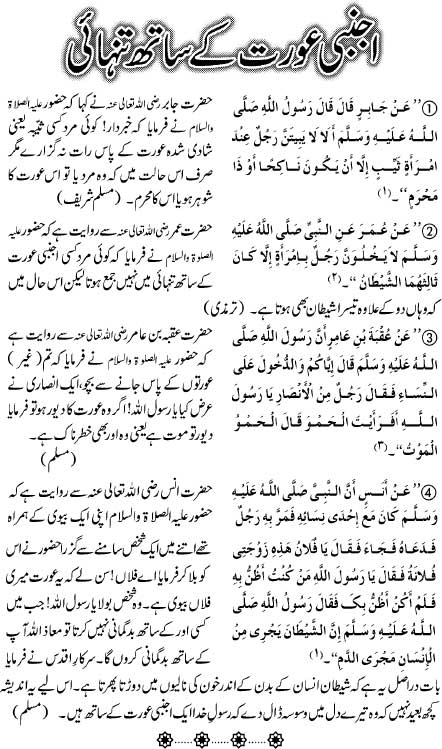
Exposing Modern Muslim Misleaders
Strangely, there is a class of so-called “Muslims” supported by Western neo-con think tanks who are full-time “da’ees” inviting people to the path of Shaitan, in the name of Islam.
These “Muslims” go to great lengths to explain how we should not practice our faith. In short, keep the title only, but discard the religion.
They are the new modernists created and funded by people who are working non-stop in their war against Islam. Nothing is obligatory for them. No rules at all. Here are some general issues with these people:
1. They attack the sources
They do not want to understand the Qur’an in the way it should be understood, even though the verses are very clear. They belittle the second most important source of Islam – the Hadith. They either play on the ignorance of Muslims or invent blatant lies about the Hadith.
Let there be no doubt left that the way Hadith has been preserved is superior to any standard of authentication ever known to human history and that will ever be known till the Day of Judgment. Such are the sciences of Hadith. Such is the manner in which the Hadith were preserved. The Ahadith are 500% more verifiable, more authentic, and hence have more reasons to be believed in, than the front-page report of any newspaper. Such was the strict conditions applied for the acceptance of Hadith. Usool Al-Hadith (sciences of Hadith) will testify to that.
2. Changing Islam
These “Muslims” really believe in secularism, not in the pure Shariah. So they try to fit Islam according to the world’s ever-changing standards of ethics. They have a problem with accepting some of the laws of Islam or few things that may have been permitted or prohibited in Islam. Allah says:
“Do you believe in some parts of the Book and disbelieve in other parts? Whosoever does that would be subjected to humiliation in this life and a severe punishment on the day of resurrection.” (Qur’an. 2:85)
Realize O Muslim! Whose Messenger was Muhammad? Allah’s! His actions, his sayings, and his commands are based on the revelation from Allah. It is sufficient for non-Muslims and the skeptics to verify if Muhammad (peace be upon him) was truly a messenger or not and if the Qur’an is truly divine or not. And there are overwhelming evidence that would leave no room for doubt about the truthfulness of Islam. So if you have verified this to be true, then you cannot question the commandments of your Creator.
We are Muslims – we submit to Allah and His Messenger. When Allah and His Messenger have said something, we humbly accept it. Muslims submit to the truth immediately.
“It is not fitting for any believer, man or woman, when Allah and His Messenger have decreed a matter, to have a choice in their affair. And whosoever disobeys Allah and His Messenger, he has gone astray into manifest error.” (Qur’an, 33:36)
“But no, by your Lord (Rabb), they can have no faith until they make you the judge in all disputes between them, and find in their souls no resistance against your decisions, but accept (them) fully with submission.” (Qur’an, 4:65)
What Allah and His Messenger say is right, is right, and what they say is wrong, is wrong. End of discussion. Yet, Islam is a natural religion. It is a religion of Fitrah – the natural state in which man is born. It is based on our Creator’s Guidance. So it doesn’t order or command anything that is against the general interest of man.
One such “Muslim” writer of a recent article that was supposedly defending the Prophet (peace be upon him) called for the separation of the state and the religion in Muslim lands, called for the Hadith to be limited to “common history” and to detach away from “man-made laws” of “medieval word” and step into “21st century”. What fallacy!
Just tell me how this isn’t different from secular propaganda? So, typical secular propaganda has come in the form of an “Islamic article” that “defends” the Prophet (peace be upon him). Yet this “defense” in effect calls to reject the commandments of the Prophet (peace be upon him) in our daily life, in our economic life, and in our political life! What love and what defense?!
Let’s break down these general phrases of the writer into something practical to understand its implications, shall we? The following is the direction of the “secular states” we see in our world today:
• Man is the superior being. No place for God.
• Riba (Interest) is perfectly “OK” for the 21st century.
• Premarital sex: It’s people’s choice! Marriage: Debasement and abuse.
• Homosexuality: Must be permitted. We’re in the 21st century. Freedom!
The writer says if we Muslims don’t “step into 21st century” and accept these “universal human rights”, which I have summarized above, “then we better be prepared to be mocked as stragglers in the caravan who are slowing down the progress of all humanity.”
Mr. Writer, Muslims need not leave their religion to escape the mockery of a people who don’t believe in Allah!
Just tell me how and why should man’s stances change on these immoral issues I’ve listed above? These evils don’t change into good because of advancement. What is advancement? What is enlightenment? What we see in today’s world is only scientific advancement. Socially, we are falling and regressing to new lows.
Nay, Muslims need not change their fundamentals to be accepted by the world. The world is stumbling down towards its destruction by adopting hedonism in the name of freedom. Muslims need not follow that path. Islam dictates every aspect of our life, and we should be proud of that! Our Creator did not leave us to wander without guidance and fall into the pits that we see the world falling into. We are the ones who believed in His Message.
Yes, the divine laws came down 1400 years ago. But they were with imbued such wisdom that they could be applied in the 21st century and in the centuries to come. While Shariah has specific laws for things that don’t change, it largely has general outlines and principles that can be applied to any issue that may come up with the advancement of time.
There have been in the past and will always be in the future people who call people towards the path of Shaitan and who work tenuously to misguide Muslims. But Allah has promised to protect Islam. So Islam has not changed through the ages and it will continue to be protected till the Day of Judgment.
We as Muslims must be careful about the sources where we take our Islam from. We should learn Islam from the roots – the Qur’an and the Sunnah.
We should learn Islam from scholars who stick to the Qur’an and Sunnah and the interpretation of the early generations of Muslims. Because the understanding of the early generations is what is authentic and has been approved of by Allah and His Messenger.
Eid ul-Fitr Aur Eid Al-Adha
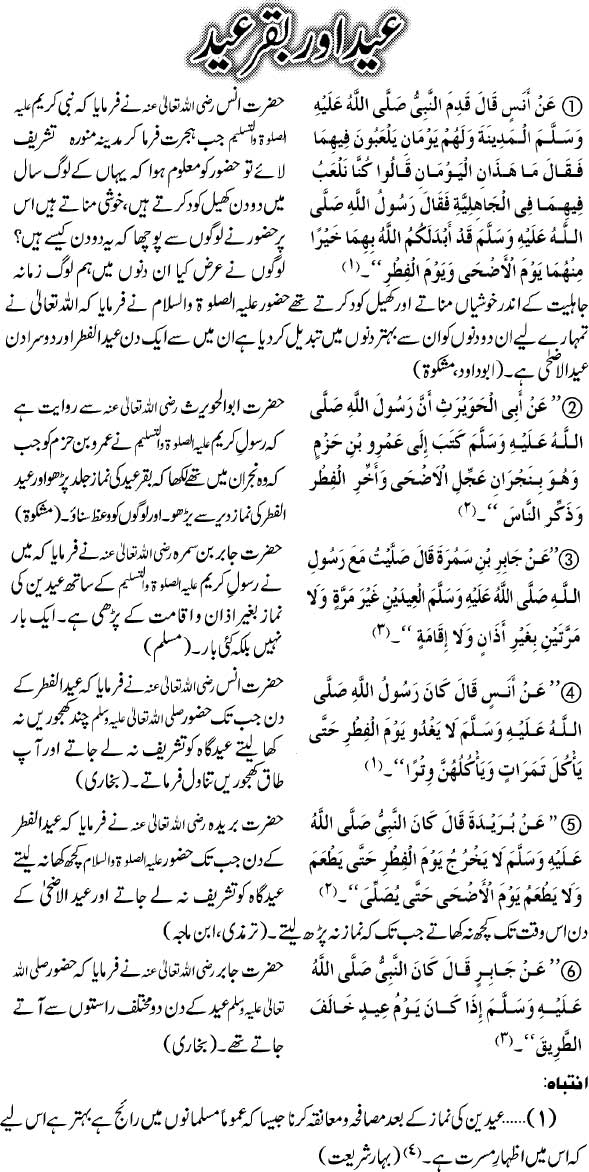
The Greatest Statement Ever
MILLIONS of Muslims around the world pronounce this statement on a regular basis. It is heard in the call to prayer, in our daily lives, in sermons, read in books, fought and died for, and the basis of our religion. It differentiates believers from non-believers and is the key to enter into paradise. All the Messengers and Prophets came to propagate and teach it in order to take people from darkness to light. Above all, it is the reason Allah created us for. Allah says in the Qur’an:
“And I (Allâh) created not the jinns and humans except they should worship Me (Alone)…” (Qur’an, 51:56)
The testimony of faith, the Kalimtul-Haqq, the Kalimatul-Ikhlas – Laa ilaaha illa Allah – comprises the greatest statement ever. It means ‘None has the right to be worshipped except Allah’. However, as we all utter these beautiful words on a daily basis we should ask a few questions:
Do we understand it and fulfill its obligations?
Are we aware of its conditions?
Just utterance alone without understanding its meaning is something that may not stop us from associating partners with Allah; something that is the essence of this great statement. Allah says in the Qur’an,
“Worship Allâh and join none with Him in worship…” (Qur’an, 4:36)
Allah, our Creator, and Sustainer has commanded us to worship Him alone, without any partners.
We may think we are, but without knowledge of this statement can we really knowingly stop ourselves from the gravest of sins?
“Verily, Allâh forgives not that partners should be set up with him in worship, but He forgives except that (anything else) to whom He pleases, and whoever sets up partners with Allâh in worship, he has indeed invented a tremendous sin.” (Qur’an, 4: 48)
The statement has two pillars:
1-NEGATION
None has the right to be worshipped
To negate anything and everything that is worshipped besides Allah
2-AFFIRMATION
Except Allah
To affirm that Allah and only Allah has the right to be worshipped
Conditions of Worship:
Must be sincerely for the sake of Allah alone
Must be in accordance with the Sunnah of the Prophet (peace be upon him)
Types of worship in the Qur’an and Sunnah:
Supplication (Du’a), Fear (Khawf), Hope (Rajaa), Reliance (Tawakkul), Longing (Raghbah) and Dreading (Rahbah), Submissiveness (Khushoo’), Awe (Khashyah), Repentance (Inaabah), Seeking Assitance (Isti’aanah), Seeking Refuge (Iti’aadhah), Asking for Help (Istighaathah), Offering Sacrifices (Dhabah), Making Oaths (Nadhar) and all other types of worship that Allah commanded – all of these belong to Allah alone.If any act of worship is directed to other than Allah, then Shirk has occurred.
Conditions of the Laa ilaha illAllah are seven:
Conditions Results
- Knowledge expels ignorance
- Certainty expels doubt
- Sincerity expels shirk
- Truthfulness expels hypocrisy
- Love expels hate
- Submissive compliance expels deviation
- Acceptance expels rejection
References: Aqeedah of Tawheed, by Sheikh Saleh Al-Fawzaan and The Three Fundamental Principles, by Sheikh Muhammad Ibn Abdul Wahhab Virtues of Laa ilaaha illAllah
Haafidh Ibn Rajab mentions many virtues of this statement in his essay entitled Kalimatul-Ikhlaas ( p. 54 -66)
- It is the price to pay for the Gardens of Paradise
- His whose last words are none has the right to be worshipped except Allah will enter Paradise
- It is a salvation from the Hellfire
- It necessitates being forgiven
- It is the best of all good actions
- It wipes away sins
- It renews the faith in the heart
- It outweighs the record of sins on the scales
- It is the best of what the Prophets have said
- It is the best form of remembrance, the best of actions, and the one that is multiplied the most in reward
- It is a protection against the devil
- All eight gates of Paradise will be opened to its testifier and he may enter from any gate he chooses
With all this in mind, it is imperative that we all learn its pillars and conditions so that we can say it with full meaning and understanding preventing us from falling into associating partners with Allah.
Indeed Allah has forbidden for Hell the person who says ‘There is nothing that has the right to be worshipped but Allah’, seeking thereby the Face of Allah.
(Bukhari and Muslim)

